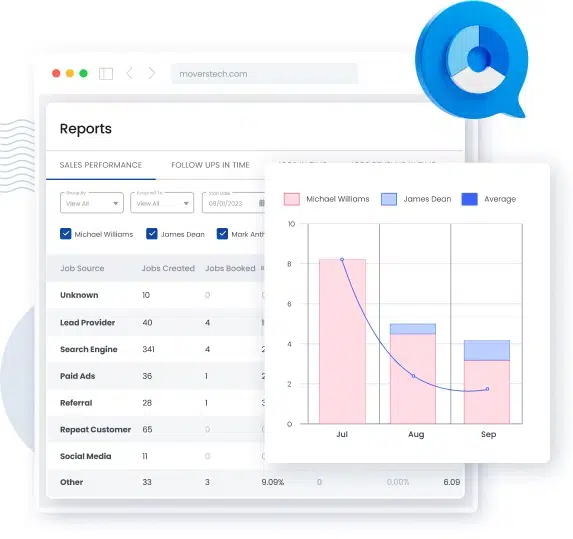CRM in digital marketing helps moving companies capture leads, automate communication, and understand customer behavior across every touchpoint. This guide explains why CRM is important for your digital marketing strategy, how it improves targeting, engagement, and service quality, and why movers benefit from a platform built specifically for moving workflows.
If your moving company isn’t using a CRM, you’re missing out on better leads, smarter campaigns, and faster growth. CRM in digital marketing helps you manage every interaction, automate your workflow, and improve results across the board. MoversTech CRM is designed for movers. It is built to streamline dispatch, capture leads, automate communication, and deliver real-time marketing insights. Instead of juggling tools, you get one platform that helps you do better moving sales and scale your business with less effort. We will tell you why CRM is important for your digital marketing strategy and how it drives your entire strategy forward.
What is CRM in digital marketing?
CRM stands for Customer Relationship Management. Digital marketing is the system that helps businesses track, manage, and optimize every interaction with potential and existing customers. From the first click on an ad to the final sale—and everything in between—a CRM keeps your data organized and actionable. This is why CRM is important for your digital marketing strategy.

The role of CRM in digital marketing is to bring structure, automation, and insight to your marketing efforts. It helps you understand your audience, segment your leads, automate follow-ups, and measure campaign results.
This is where MoversTech CRM stands out. Unlike generic platforms, it’s built for the moving industry and tailored to your workflow. It combines CRM and digital marketing into one system that’s easy to use and ready to scale with your business. You can:
- Capture leads from your website or ads and track their progress automatically
- Assign jobs and manage dispatch without switching tools
- Automate customer communication with email and SMS
- View real-time reports to see what’s working—and what isn’t
When you choose MoversTech, you get a marketing digital CRM system designed to help movers like you close more jobs and stay organized. That’s the difference in the benefits of CRM when it’s built specifically for your industry.
MoversTech CRM—A CRM digital strategy built for movers
Not every CRM is built with your business in mind. Most platforms try to serve everyone, so they don’t fully serve anyone. MoversTech CRM is different. It’s designed by movers, for movers, which is why CRM is important for your digital marketing strategy. It has tools tailored to the daily challenges of running and growing a moving company through digital marketing.

This CRM digital strategy goes beyond lead tracking. It gives you control over operations, finances, communication, and performance—all from one platform. With specialized CRM system features, you can:
- Capture leads. Instantly collect leads from web forms, calls, or campaigns. Leads are tracked automatically, assigned to the right team member, and followed through each stage—so nothing gets missed.
- Streamline dispatch. Manage crews, assign jobs, and track schedules from one dashboard. No spreadsheets or back-and-forth calls needed.
- Automate your finances. Create invoices, process payments, and generate financial reports with minimal manual input. MoversTech reduces billing errors and helps you stay on top of cash flow.
- Stay connected. Use automated email and SMS to confirm bookings, send reminders, and request reviews. You can also streamline internal communication between teams.
- Resolve claims. Track, respond to, and manage claims in real time. Improve transparency and speed up resolutions without adding stress.
- Create and eSign Documents. Send contracts and forms that clients can sign digitally. This cuts down paperwork and closes jobs faster.
- Get real-time reports. Monitor your marketing performance, team productivity, and lead sources. These interactive reports give you insights that help you make smarter marketing decisions.
Top reasons why CRM is important for your digital marketing strategy
Digital marketing is about reaching the right people with the right message. That’s where CRM and digital marketing go hand in hand. With MoversTech CRM, moving companies can manage leads, automate communication, and improve marketing performance without wasting time or resources. That is how CRM helps in marketing. Here are the main reasons why CRM is important for your digital marketing strategy:
- Precise audience targeting and better ROI
- Enhanced customer engagement
- Consistent, professional customer interactions
- Higher efficiency through CRM automation
- Exceptional customer service
Precise audience targeting and better ROI
Generic ads waste budget. When you know exactly who your audience is and how they behave, your marketing gets more efficient.
MoversTech CRM helps you capture and track leads across your website, forms, and campaigns. With built-in reports, you can see which channels bring in quality leads and how they move through your sales funnel. This moving company CRM solution lets you adjust your strategy in real time for better results.
The combination of lead capture and real-time reports gives you a digital marketing CRM system that maximizes return on investment by targeting the right prospects and closing more deals.
By integrating your landing pages with MoversTech CRM, every inquiry, whether via a web form or a click-to-call button, flows straight into your dashboard in real time. From the moment a prospect taps “Submit” or any CTA you’ve configured, you’ll immediately see which campaign, ad, or page generated that lead—no manual tagging required. These seamless integrations surface new contacts by the minute, empowering you to follow up promptly and attribute ROI down to each individual click.
Enhanced customer engagement
Your prospects don’t want to be spammed. They want clear, relevant communication. MoversTech CRM makes this easy with automated email and SMS tools. This is why CRM is important for your digital marketing strategy. You can confirm bookings, send reminders, and follow up after a move without lifting a finger.
This helps you stay top of mind, boost satisfaction, and build a healthy sales pipeline from repeat customers or referrals. Keeping engagement high throughout the customer journey makes your digital marketing efforts more effective.
Consistent, professional customer interactions
Consistency builds trust. If your team isn’t aligned, your messaging becomes disjointed. Potential clients will notice. With MoversTech, your dispatch and claims tools sync with your marketing system. Your team always has access to up-to-date customer history and status. Whether you’re following up on a quote or addressing a concern, everyone works from the same information.
This level of digitized customer service keeps your communication clear, your responses accurate, and your digital marketing aligned with the actual customer experience. The result is a more professional image and stronger brand trust.
Higher efficiency through CRM automation
Manual work slows you down and creates room for error. This is another example why CRM is important for your digital marketing strategy. It automates the everyday tasks that take up your team’s time, like sending invoices, assigning jobs, or following up with leads.
By automating your operations and finances, CRM can boost your teams’ efficiency, letting them focus on what matters most: closing jobs and delivering great service. Automation also helps your digital marketing strategy run smoothly. You can launch campaigns, track lead behavior, and respond faster—all from one place.

Exceptional customer service
Marketing doesn’t end after a customer books a job. Your customer experience influences reviews, referrals, and long-term growth. MoversTech CRM supports your service team with tools like eSignature documents. These features speed up resolutions and remove friction from the moving process. A strong service experience improves your online reputation and increases retention, which feeds back into your digital marketing success.
Each of these five benefits shows how CRM helps in marketing, not only by improving strategy, but also by improving how your business runs. Every campaign works harder for you when your systems are connected and your teams are aligned.
MoversTech CRM advantages
A CRM should do more than store contacts. It should help you run smarter campaigns, deliver better service, and grow your business with less effort. That’s exactly why CRM is important for your digital marketing strategy.
This is not just another marketing digital CRM. MoversTech combines marketing tools with operational features in one easy-to-use platform. You don’t have to switch between apps or chase down scattered information. Everything you need—leads, schedules, customer data, invoices, and reports—is in one place, fully integrated and ready to use. Here’s what sets MoversTech apart:
- A user-friendly interface made for moving company staff, not tech experts
- All-in-one platform for lead management, customer communication, dispatch, and finances
- Fully customizable system to match your sales process, marketing flow, and team structure
- Real-time analytics that show what campaigns are working and where to improve
Let MoversTech CRM grow your moving business
Stop relying on disconnected tools and guesswork. With MoversTech CRM, you get a powerful system built to improve your digital marketing, streamline your operations, and help you close more jobs. Whether you want better leads, smoother communication, or stronger results from your campaigns, MoversTech gives you the tools to make it happen without the extra work. Ready to see why CRM is important for your digital marketing strategy and how it works? Book a free demo today and discover how MoversTech can support your business from lead to close.
Reviewed by: Ned Bjelos


